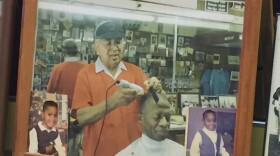Would it surprise you to hear that Dr. Martin Luther King, Jr. wasn't the only name under consideration to lead the Montgomery bus boycott in 1955? Over the last month, Alabama Public Radio has been examining the work Dr. King did in Alabama and his impact here. This special series of reports is airing ahead of the fiftieth anniversary of Dr. King's assassination in Memphis this Wednesday. Be sure to tune in Wednesday night at 7 pm for the APR news special "The King of Alabama." I sat down with civil rights attorney Fred Gray in his law office in Tuskegee. Gray represented Rosa Parks, Dr. King, and Claudette Colvin whose arrest for refusing to surrender her seat on a city bus preceded the incident with Parks. Part of our discussion with Gray dealt with the Montgomery bus boycott and how that protest helped propel Dr. King toward his international stature as a civil rights leader. The story begins at the home of Gray's collaborator on the boycott, Jo Ann Robinson, where the question of picking a spokesman for the Montgomery bus protest came up. Click here for Gray's thoughts on the matter...
At that time, we two black leaders in Montgomery. E.D. Nixon who was “Mr. Civil rights,” who normally would have been the person to serve in that capacity. But, then you also had Rufus Lewis, who was interested in only aspect of civil rights, and that is voter registration—getting a person elected and holding them accountable once they were elected. And, he owned a night club. The name of the night club was “The Citizens Club” and you had to be a registered voter in order to be there.
We were afraid that if either one of them was selected as spokesman, we would lose some of the supporters of the other. Jo Ann said ‘why don’t we get my pastor, Martin Luther King. He hasn’t been involved in civil rights activities, he hasn’t been here long. But, one thing he can do is move people with his words.’ I said that was the kind of person we need for that, and I said fine.
I suggested to her key roles for these other two men. I said with respect to E.D. Nixon, it’s easy, he’s a Pullman car puller…President of his union in New York is H. Phillip Randolph…black labor leader. If he’s (Nixon) made the treasurer and if we’re able to get people to stay off the buses, he will help E.D. Nixon raise money to support bus boycott.
Now, what are we going to do with Rufus Lewis? Not much you can do with voter registration. However—Rufus Lewis had a wife whose name was Jewel. Jewel Lewis is co-owner of the largest black funeral home in Montgomery. Then, was then, and is now…Ross-Clayton Funeral Home. She was the daughter of Clayton. Let’s make her husband chairman of the transportation committee. She’ll be able to get the cars of their funeral home and the other black funeral homes and the others in the area. And, they help us transport people. Then, the only other thing was who the lawyer was going to be? Well, here am I…send me.
Those were the plans we made…assigned responsibilities to each other. And, Jo Ann went, after we got through with our little meeting, and started making our phone calls…she went to the campus Alabama State University, ran off the leaflets, passed them out on Sunday. And when Dr. King spoke at the mass meeting on the fifth of December, after the people had stayed off the buses, we knew we had done the right thing. And now, you have Dr. King introduced too…and that was his beginning of his activities in the civil rights movement, And, I was appointed at the same meeting where he was appointed to be the spokesmen, I was responsible for getting the legal work done. And that was a great responsibility. So, for the next three hundred and eighty two days, on a day-to-day basis, I dealt with Dr. King because we events to come up. But, I had enough sense at the very beginning to know that I was a young lawyer just out of law school, and needed to get the very best help I could get. I got on the phone, talked to Thurgood Marshall, and he invited to come up to his office, and that was the second week in December after the bus boycott started. And, I took a copy of a complaint that we later filed, Browder v. Gayle, and was able to give Dr. King the legal basis that he needed, and that enabled him to go from that time, up to the time of his death.









